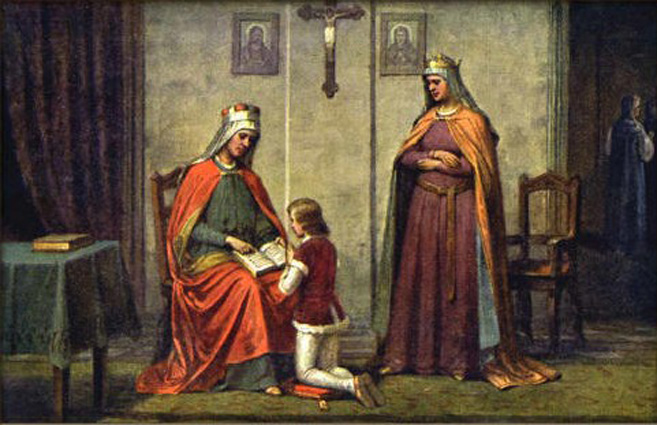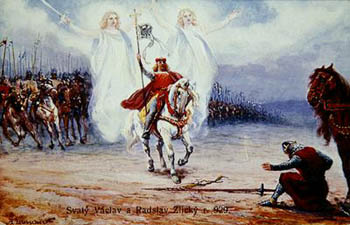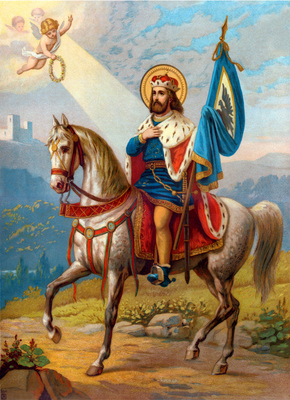 St. Ludmilla instructs St. Wenceslaus in the Catholic Faith St. Wenceslas, King and Martyr by Father Francis Xavier Weninger, 1876
St. Wenceslas, duke of Bohemia, was the son of Wratislas and Drahomira. In proportion as his father was a model of all Christian virtues, his mother was the possessor of all vices, besides being a great enemy to the Christian Religion. Wratislas, upon his dying bed, gave Wenceslas in charge of his grandmother Ludmilla, while Boleslas, his younger, was kept by Drahomira. As both women were totally different in their morals, so also the conduct of the two children became entirely unlike. Wenceslas became pious and holy; Boleslas, godless and licentious. Drahomira seized the government of the state and persecuted the Christians most cruelly. She banished the priests, dismissed the Christians from all public places, which she filled with heathens of whom the faithful had nothing to expect but cruelty. The nobles would not submit to this administration, and deposing Drahomira, placed Wenceslas on the throne, and bound themselves to him by an oath of allegiance. Drahomira, burning with rage when she perceived that the Christians were again protected by the pious Ludmilla, was determined to revenge herself. She sent some hired assassins who strangled her with her own veil, while she was at her devotions in her private chapel. Not satisfied with this murder, Drahomira sought to make away with her son Wenceslas.
Meanwhile, this holy Prince conducted himself towards God and his subjects in such a manner, that he was beloved and highly esteemed by every one. He was extremely kind in all his actions, temperate in eating and drinking, unwearied in his care for his subjects, and blameless in his whole conduct. He was so charitable to the poor and to prisoners, so compassionate to widows and orphans, that the Christian world could count but few men like him. The prisoners he visited at night and gave them rich alms, the sick he supplied with all they needed, and showed a fatherly heart to the widows and orphans. It is known that he himself, at night, carried wood upon his shoulders to the destitute. Not a shadow of impurity tarnished the brightness of his life, and he preserved his chastity unpolluted to his end. He gave daily several hours to prayer, and even in winter frequently visited the Church at night barefooted. One of his servants who accompanied him, one day complained of the cold, and the duke told him to step in the footprints which he, walking before him, had made in the snow. The servant did so and no longer felt any cold; for the footprints of the prince were warmed by his love to the Holy Eucharist. Towards the priests he was always extremely generous. He often served them at the Altar, and allowed not the least wrong to be done them by word or deed. He distinguished himself especially in his devotion to the Holy Mass at which he daily assisted. He sowed, gathered and prepared with his own hands, the wheat which was used in making the Hosts; and cultivated and pressed the grapes for the wine used at Holy Mass. In one word, Wenceslas reigned and lived like a Saint. Count Radislas, scorning the piety of the duke, caused the people to rebel and marched against Wenceslas. The latter, sending him a deputation, made offers of peace, but Radislas would not even listen to the king's message, esteeming it a sign of Wenceslas's cowardice. Hence the holy duke was forced to meet him at the head of his army. The two armies were drawn up opposite each other in battle array, when Wenceslas, sad that so much innocent blood should be shed, and being willing rather to give his own than that of his subjects, challenged Radislas to single combat, with the condition that the victory should be on the side of him who should slay his adversary. 
Radislas accepted the challenge, and spear in hand, galloped in full armor towards the Saint. The latter was also clad in armor, but carried only a sword. Radislas intended to unhorse Wenceslas with his spear and thus have him in his power. The Saint went to meet him, making the sign of the cross. At the moment when Radislas was about to thrust his spear, he saw, by the side of Wenceslas, two angels who cried to him: "Stand off!" This cry acted like a thunderbolt upon Radislas, and changed his intentions. Throwing himself from his horse, he fell at the Saint's feet, asking for grace and pardon, promising obedience in future. Wenceslas raised him from the ground and kindly received him again into favor.
Anima Christi (Soul of Christ)Soon after, the duke was summoned to Worms to assist at the general Diet. The emperor and all the princes and dignitaries were already assembled, but Wenceslas had not yet appeared as he was detained by hearing Mass. Thinking that his delay was intentional and caused by pride, they determined to receive him very coldly, and without the honor he had a right to expect. But when the Saint entered the hall, Otho, the emperor, saw two angels accompanying him, carrying before him a golden cross. When the Emperor had recovered from the awe with which this sight had inspired him, he arose from his throne and going towards the Saint, he led him to the seat prepared for him. The entire assemblage were greatly astonished at this act of the emperor, but when he related what he had seen, they all regarded the Saint with the greatest reverence. The emperor also bestowed the royal dignity and power on Wenceslas, and presented him with the arm of the holy martyr, St. Vitus, which Wenceslas received gratefully and with due respect, and took with him to Bohemia. At the close of the Diet, the Saint returned as king, and continued his holy life.  The more the pious monarch was loved and honored by his subjects on account of his holiness and his new dignity, the more hostile Drahomira and Boleslas grew towards him. Wenceslas, who perceived this, determined to resign his crown. But the wicked Drahomira would not wait for this. Boleslas had become father of a son, and Wenceslas was invited to be present at the baptism of the young prince. Although the holy king had reason to suppose that this invitation covered other intentions, he accepted it, in order not to manifest any distrust of his brother. Having gone to confession and Holy Communion, he went fearlessly to the palace of Boleslas. He was received with great honor and magnificently entertained. At midnight, before the banquet was ended, the Saint quietly left the hall, and went, according to his custom, into the Church. Drahomira seized this opportunity, and calling Boleslas aside, told him that the hour was now come when he could revenge himself and make the royal crown his own. The blood-thirsty tyrant needed no persuasion. Seizing his sword, he hastened, with some attendants, into the Church and stabbed his holy brother with such brutal force, that the blood bespattered the wall, where it is yet to be seen at this day. But the punishment of God soon overtook the murderers. The earth opened and swallowed Drahomira, the instigator of the sinful deed, with her horse and carriage, in that part of Prague which is called the castle of Ratschin. Of the murderers who were with Boleslas when he committed the crime, some lost their reason, while the rest died by their own hands. Although God delayed the punishment of Boleslas, it came at last. Having long been tormented by most painful maladies, at length he expired in all his wickedness.
The more the pious monarch was loved and honored by his subjects on account of his holiness and his new dignity, the more hostile Drahomira and Boleslas grew towards him. Wenceslas, who perceived this, determined to resign his crown. But the wicked Drahomira would not wait for this. Boleslas had become father of a son, and Wenceslas was invited to be present at the baptism of the young prince. Although the holy king had reason to suppose that this invitation covered other intentions, he accepted it, in order not to manifest any distrust of his brother. Having gone to confession and Holy Communion, he went fearlessly to the palace of Boleslas. He was received with great honor and magnificently entertained. At midnight, before the banquet was ended, the Saint quietly left the hall, and went, according to his custom, into the Church. Drahomira seized this opportunity, and calling Boleslas aside, told him that the hour was now come when he could revenge himself and make the royal crown his own. The blood-thirsty tyrant needed no persuasion. Seizing his sword, he hastened, with some attendants, into the Church and stabbed his holy brother with such brutal force, that the blood bespattered the wall, where it is yet to be seen at this day. But the punishment of God soon overtook the murderers. The earth opened and swallowed Drahomira, the instigator of the sinful deed, with her horse and carriage, in that part of Prague which is called the castle of Ratschin. Of the murderers who were with Boleslas when he committed the crime, some lost their reason, while the rest died by their own hands. Although God delayed the punishment of Boleslas, it came at last. Having long been tormented by most painful maladies, at length he expired in all his wickedness.The shrine of the holy king Wenceslas was honored with many miracles, after God had crowned his virtuous soul with everlasting glory in the kingdom of Heaven.
Soul of Christ, sanctify me.
Indulgence of 300 days
Body of Christ, save me. Blood of Christ, inebriate me. Water from the side of Christ, wash me. O good Jesus, hear me. Hide me within Thy wounds. Never Permit me to be separated from Thee. From the malignant enemy, defend me. At the hour of my death, call me. And bid me come to Thee, That with Thy Saints, I may praise thee, for everlasting ages. Amen. Spiritual Communion:
My Saviour and my God! I am not worthy to appear before Thee, for I am a poor sinner; yet I approach Thee with confidence in Thy goodness and mercy, for Thou hast said: "Come to Me, all you that labor and are heavy-laden, and I will refresh you." Thou wilt not despise a contrite and humble heart. I am truly sorry for my sins, because by them I have offended Thee, Who art infinitely good. Whatever may have been my foolish transgressions in the past, I love Thee now above all things, and with all my heart. I have a great desire, a vehement longing, O divine Spouse of my soul, to receive Thee in Holy Communion, and since I cannot now receive Thee in the Blessed Sacrament, I beseech Thee to come to me spiritually and to refresh my soul with Thy sweetness.
Come, my Lord, my God, and my All! Come to me, and let me never again be separated from Thee by sin. Teach me Thy blessed ways; help me with Thy grace to practice meekness, humility, charity, and all the virtues of Thy Sacred Heart. Receive me, as one who wishes to follow Thee, and let me live and labor and suffer and pray in union with Thee, for the glory of God, for the accomplishment of the heavenly Father's will, and for the salvation of souls. Jesus! I give Thee my heart with all its affections, my soul with all its powers, and my body with all its senses. My divine Master, help me with Thy grace, that I may be ever mindful of Thy presence, and that I may be faithful to the end in Thy services. Bless me in life and in death, that I may praise Thee forever in heaven. Amen.
Omnia ad majorem Dei Gloriam! All for the greater glory of God! http://catholicharboroffaithandmorals.com/ |